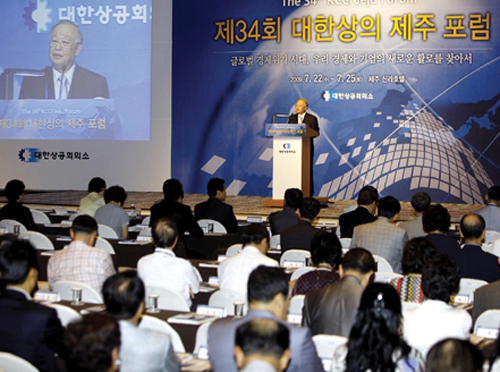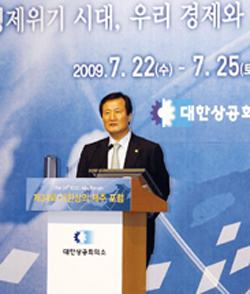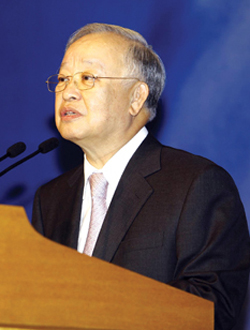34th KCCI Forum on Jeju Island
Minister Yoon predicts continued negative GDP growth unless private consumption and exports fully recover



Chairman Sohn Kyung-shik of the Korea Chamber of Commerce and Industry, in his opening speech for the Jeju Forum, called for reductions in the tax rates to those of international levels in order to encourage business leaders to rebound from the worsening business conditions and strengthen competitiveness.
The KCCI held its 34th annual forum on July 22 on Jeju Island, the usual venue, for its member firms to bring them up-to-date on various matters including both political and economic situations at home and abroad so that they can better manage their businesses. Dignitaries attending the forum included Minister Yoon Jeung-hyun of the Ministry of Strategy and Finance (MOSF) and Minister Lee Youn-ho of the Ministry of Knowledge Economy (MKE) and business leaders totaling some 400 people.
The KCCI head, in his speech entitled "Changing World, Uncertain Future and New Leadership for CEOs," focused on lowering income and corporate taxes as planned and extending the sunset period for the temporary exemption of facility investments until the end of this year to encourage businesses to make facility investments.
Sohn also said the proposal for reductions in the inheritance tax should be approved by the National Assembly as proposed and the benefits in the inheritance of SMEs should be raised to the levels practiced in advanced nations, while at the same time, the inheritance taxes on majority shareholders currently ranging from 10 to 30 percent should be scrapped.
He also called on the government to allow the opening of medical corporations by businesses as soon as possible, which is being limited to medical doctors, dentists, the government and local autonomous entities.
Such countries as India, Singapore and Thailand, where businesses operate medical facilities, have been able to attract more tourists, expand trade and increase foreign investments. Chairman Sohn also called for the ultimate termination of the non-permanent employee system, as it is just a temporary measure necessary to prevent imminent mass unemployment.
He also called for smoother management-labor relations to prevent any damage to the normal operations of businesses from labor strife, stable employment and the creation of jobs through flexible union policies. He said the labor strife at Ssangyong Motor, which has been going on for over 60 days now, should end immediately since it would not be of help to the company and the union itself, as the period for condoning illegal activities as normal practices should also end immediately.
Sohn also called on CEOs to have a sharp eye, a wider international sense and be top strategists able to catch new opportunities and take advantage of them with strong decision-making power to put them into practice. He also said they should be able to open up a new age for businesses to create a creative society and cut costs through ceaseless restructuring to strengthen their internal power.
In the meantime, Minister Yoon said the economy has been showing signs of improvement since the first quarter with the growth rate recording 0.1 percent better than Q4 of last year and growing 2.3 percent more in Q2 compared to Q1. June's employment figure also increased by 4,000, moving into positive territory for the first time in seven months. Industrial productivity and the sentiment indices for consumers and businesses have also improved rapidly, the minister said.
He added that the international balance of payments have been continuously in the black along with an improvement in overseas borrowing conditions and foreign exchange liquidity. The foreign exchange rate has steadied at the 1,200 won per dollar level recently, with the KOSPI index breaking the 1,500 mark.
But, the minister said, uncertainties still remain in the economic conditions both at home and overseas. Various differing predictions remain on the future of the world economy; one said the economy is on the way to recovery, while others remain doubtful.
Concern over nonperforming assets, especially commercial buildings, still remain strong in the international financial community, although investors are optimistic with the DJIA jumping over the 9,000 mark on the New York Stock Exchange lately. Both the IMF and the World Bank expect the world economy to recover in earnest in 2010.
"Under such an economic predicament, we can hardly count on exports to lead our economy out of the slump and the stimulus measures through policy investments have limits, unless private consumption recovers," Yoon said.
Taking all of these conditions into account, the economy is expected to grow at minus 1.5 percent this year, while next year the economy is projected to register 4 percent growth, the minister said. nw
Minister Yoon Jeung-hyun delivers a speech on government stimulus measures to recover the economy from its current slump at KCCI's Jeju Forum.
President Sohn Kyung-shik of the Korea Chamber of Commerce and Industry (KCCI) delivers a speech to open KCCI's summer forum on Jeju Island July 22.
3Fl, 292-47, Shindang 6-dong, Chung-gu, Seoul, Korea 100-456
Tel : 82-2-2235-6114 / Fax : 82-2-2235-0799